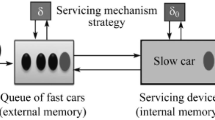Abstract.
In this paper, the use of queueing theory for modeling uninterrupted traffic flows is evaluated. Empirical data on speeds and flows are used to evaluate speeds generated by the different queueing models. Using the Theil inequality coefficient as evaluation criterion, the speeds generated by the queueing models are compared to the empirical speeds. Queueing models that best fit the observed speeds are obtained. It appears that traffic flow on a highway during non-congested hours is best described using a M/G/1 queueing model. During the congested hours however, the state dependent queueing GI/G/z models are more realistic. Because the queueing models describe the empirical data well, they can also be used to evaluate potential improvements in existing traffic conditions.
Similar content being viewed by others
Author information
Authors and Affiliations
Corresponding author
Additional information
Received: April 2005 / Revised version: June 2005
AMS classification:
60K30, 68M20
Rights and permissions
About this article
Cite this article
Woensel, T.V., Vandaele, N. Empirical validation of a queueing approach to uninterrupted traffic flows. 4OR 4, 59–72 (2006). https://doi.org/10.1007/s10288-005-0075-9
Issue Date:
DOI: https://doi.org/10.1007/s10288-005-0075-9




